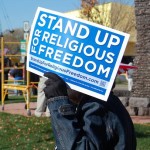An interesting observation from Stephen F. Knott, author of Rush To Judgment: George W. Bush, the War on Terror, and His Critics:
Contempt for President Bush was rooted in something deeper than policy disputes or concerns over the scope of presidential power — it was also a reflection of the religious and cultural fissures in the American body politic. Bush’s overt religious views were clearly a source of some discomfort in an increasingly secular society. A New York Times review of Bush’s memoir reveals much about the attitude of the nation’s newspaper of record toward religion, as it mocked his decision to stop drinking “with the help of God, who spoke to him while he was out jogging,” and his claim that, as the Times put it, “God told him to run for president.” The Times reviewer added: “Asked at one of the presidential debates who his favorite philosopher was, he thought of answering Locke or Mill, he says, but felt mysteriously compelled to answer, ‘Christ.’” Bush’s complete response was, “Christ, because he changed my heart,” is still the subject of ridicule ten years after it was delivered, for his “mysterious” answer was, in eyes of the sophisticated, a “twofer.” It was embarrassing enough that Bush would proclaim his faith in Christ in such an overt fashion, but it was positively beyond the pale that it would come in response to a question about who was his favorite philosopher. Needless to say, Bush’s response was unlikely to win him plaudits among the nation’s intellectuals.
George W. Bush’s religious views were no more overt or extreme than Jimmy Carter’s, yet somehow they generated far more discomfort than Carter’s. Some of the greatest figures in American history, i[t] should be noted, held strong religious views (Martin Luther King Jr. immediately comes to mind, as does Woodrow Wilson). But it is perhaps indicative of a growing sense that a high wall of separation is required between the secular and religious sphere in America that Bush was viewed with such suspicion.”
At a time where we’re facing the possible reelection of a president who had eroded religious freedom as a matter of federal policy — one of the cornerstones of his administration thus far — it is particularly worth reflecting on where we are.
By the way, if you haven’t read W.’s memoir, do. I reflected on it here when it came out.
















